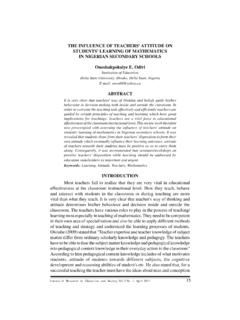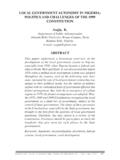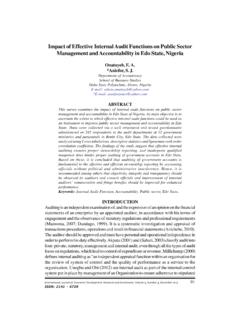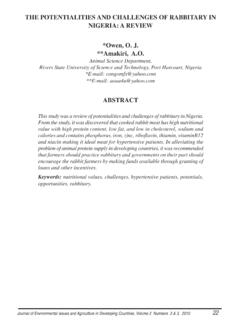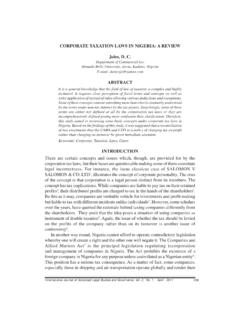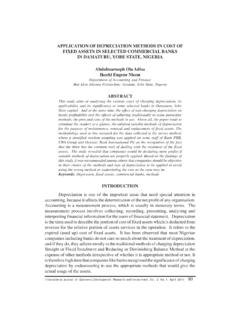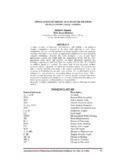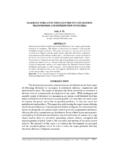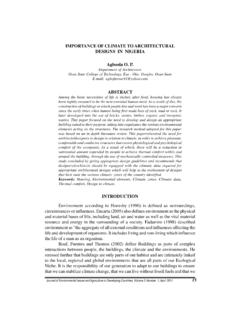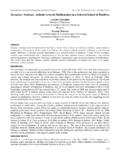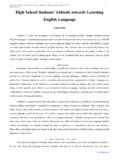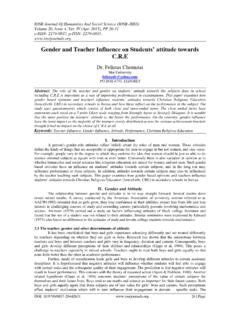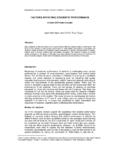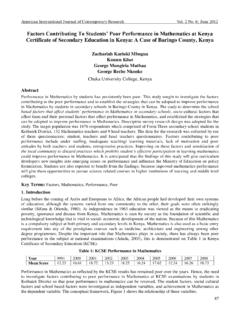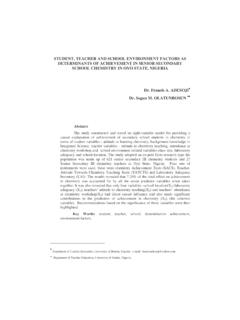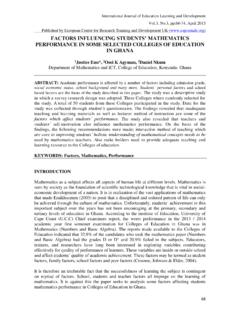Transcription of FACTORS RESPONSIBLE FOR POOR …
1 Journal of Research in Education and Society ,201055 FACTORS RESPONSIBLE FOR poor performance OF STUDENTSIN mathematics IN nigerian secondary SCHOOLS*Popoola, F. , R. of Agriculture and Animal ScienceAhmadu Bello University, Mado Road, Kaduna State, Nigeria*E-mail: study investigated the FACTORS that are RESPONSIBLE for poor performance ofstudents in mathematics . A random sample of 109 students from Best Start CollegeMango Kaduna was used. The research instrument was a reliable and validated20 items likert type questionnaire which was administered on 109 secondary schoolstudents to obtain responses on the FACTORS that are RESPONSIBLE for poorperformance of students in mathematics .
2 The responses were analyzed using t-test statistic. At significant level and 38 degree of freedom , the calculated t-value was and the t-critical was Since t critical was significant thenull hypothesis was retained. Thus, there was no significant difference among therespondents concerning the FACTORS that are RESPONSIBLE for poor performance ofstudents in mathematics in nigerian secondary schools. One of therecommendations made was the need for efficient and effective teachers who areprofessionally and academically qualified to promote mathematics learning : performance , students , mathematics , secondary schoolINTRODUCTIONThe index for science, technology and mathematics education has beenacclaimed widely to be a pointer of measuring the socio-economic and geopoliticaldevelopment of any nation (Betiku, 2001a).
3 mathematics is one of the core subjectsto be offered by all students up to tertiary levels of education among Science andTechnology courses. It is one of the compulsory subjects. This compulsory nature ofmathematics carries with it an assumption that all members of our society shouldhave the knowledge of the subject. The competence of mathematics is a crucial andcritical determinant of the post- secondary education and the options available toyoung people (Sells, 1978; Ojo, 1986).However it is disappointing to note that the students ' performance inmathematics at internal an external examination has remained considerably poordespite the relative importance of mathematics (Ale 1989).
4 Many variables havebeen implicated as RESPONSIBLE for discouraging performance of students . These areGovernment related variables, examination body related variables, curriculum relatedvariables, test related variables, textbook related variables, home related variablesand student related variables. Amazigbo (2000) identified specific variables, such asJournal of Research in Education and Society ,201056poor primary school background in mathematics , lack of incentives for test, lack ofinterest in the part of students , students not interested in hard work, incompetentteachers in the primary school , large classes, fear of the subject psychologically, phobia has been an academic disease and its virus has not yetbeen fully detected so as to get its effective treatment in the class.
5 However thesymptoms of this disease are always observed on the faces of students when teachingand learning of mathematics take place in the classes. Bryl (1983) confirmed thatpoor performance in mathematics stemmed from anxiety and fear. This hatred formathematics is usually distributed to all subjects that have direct links withmathematics (Mughol 1976; Okeke, 1982; Busari 1988). As a result of students 'hatred for mathematics , some of them refuse to improve on interest in mathematicsin the secondary level and this is carried over to tertiary institution. It has beenobserved that students form the habit of leaving the classroom either before or duringthe mathematics lesson under the pretense of easing themselves, students refuse todo assignment and this is one of the avenues whereby the teacher can know thestudents' problems, some do not make out time to practice the subject during theschool or after the school to understand mathematics in elementary school leads to inadequatecomprehension of mathematics at secondary and tertiary level.
6 Inadequate masteryof mathematical process and fundamental concepts and skills is probably the rootcause of the difficulties encountered by individuals of all ages in anythingmathematical. Therefore the purpose of this study is to examine selected variablesand FACTORS that contribute to poor performance in mathematics from the point ofviews of male and female students and suggest necessary remedies. mathematics ,despite its closeness to the physical environment has been seen as a subject whoseconnections with the physical world are relatively ignored hence ability to perceivemathematics from the physical world may be related to one's mathematical into relationships between affective FACTORS and mathematicalreasoning supports the fact that affective domain has some impact in the learning ofmathematics in general.
7 Though there are conflicting findings on the relationshipthat may exist between affective and cognitive achievements (Simpson and Wazik,1978, Lassa 1987, Inekwe 1996), affective domain remains a powerful dimensionfor learning which should not be neglected. Souper (1976) said that "emotiongenerates energy" and if education for learning is to be more than mere training ofthe intellect (the cognitive), then the importance of the acceptance of feelings andemotion in the classroom can be seen as being more therapeutic. Hence affectivefactors like motivation of attitude towardsand perception of mathematics from thephysical environment are considered pertinent to this study. This is aimed at examiningstrategies that can remedy the dangerous situation of students who will be futureleaders.
8 Finding out FACTORS that inhibit or enhance mathematics learning andunderstanding will erase fears, lack of confidence and independent thinking that areexhibited by students . Such research will yield information for guidance to themathematics teachers on major areas of emphasis and in developing mathematics 'Journal of Research in Education and Society ,201057reasoning. Beyond this it can bring an awareness that may warrant change of emphasisand readjustments in the instructional methodologies and techniques in mathematicsteaching for the mathematics systems can also derive various useful suggestions concerningcurriculum development to shift and balance up in cognitive and affective emphasisin the teaching and learning and also learning of mathematics .
9 Teachers are the mostcritical factor in the mathematics education. They are the spark and key man in thedrive to progress in our educational system (Adesokan 200). Teachers are life wireof any mathematical education endeavour. The success of any school system largelydepends on the attitude of the teachers. If teachers have no commitment to the teachingof mathematics and exhibit trauancy, their students are bound to copy them (korau,2006). The teacher's personal attitude towards the subject and the students contributemuch to generate in students positive or negative attitudes towards the subject. Hiscommitment, concentration, consecration, concern for the students ' welfare andsuccess are attractions for the students .
10 Some teachers lack the knowledge of ethicsof the teaching profession. Some of them are harsh, sarcastic, unapproachable,antagonistic, rude to students and thunderous over any little students ' attack their students wishing them failure and some teachers spent thewhole period jesting with the students instead of teaching. All these traits andtendencies reduce the teacher to the ordinary, bringing disregard to his integrity andthe subject. Therefore the teachers' mood matters a lot. His negative disposition andpoor interpersonal relationship with the students when learning mathematics candiscourage, dispirit, dislodge and disperse them. A teacher who cannot generateenthusiasm for learning through personal involvement with the subject matter orcommunicate a sense of excitement and a contagious intellectual thrill will notencourage the students to learn.
